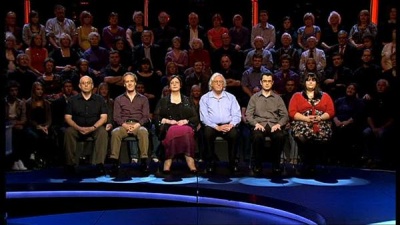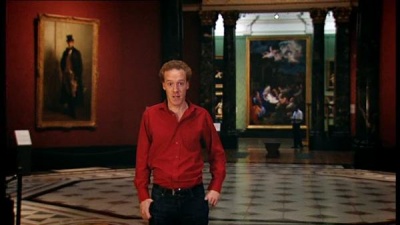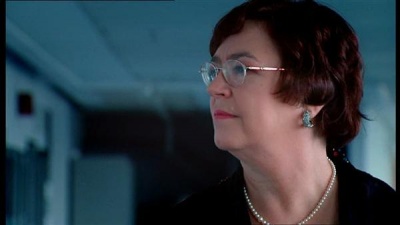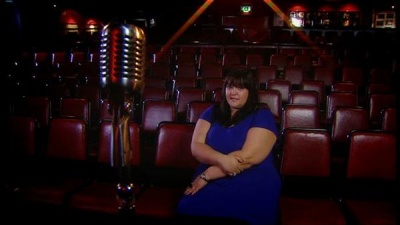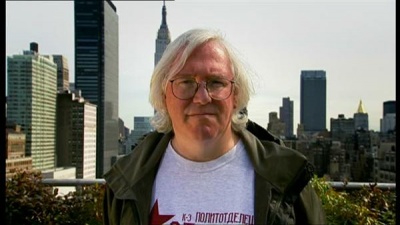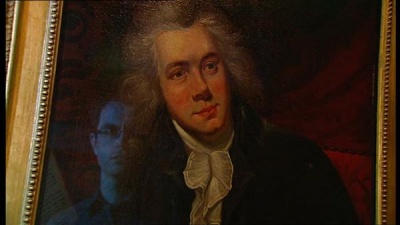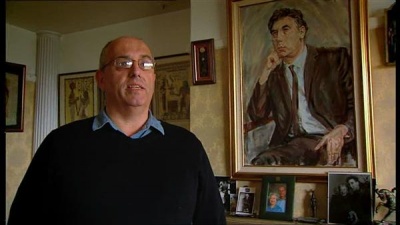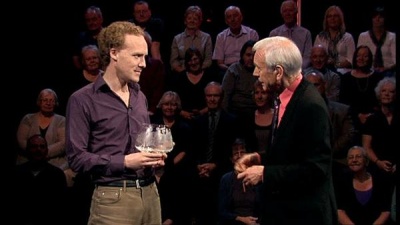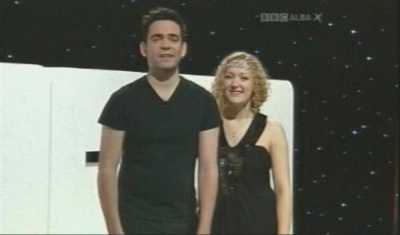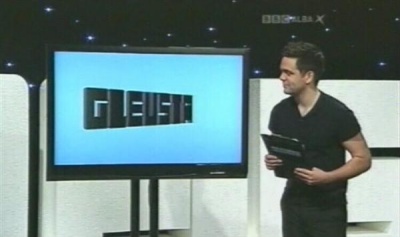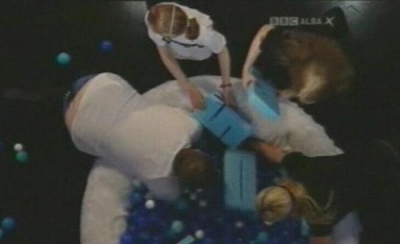Weaver's Week 2011-04-17
Last week | Weaver's Week Index | Next week
Coming up: a crash course in Scots Gaelic, the Countdown continues, and does Britain's Got Talent exploit its contestants? But first, Britain's Got Brains (And A Comfortable Black Chair).
Contents |
Mastermind
The Grand Final
It was way back in August when Mastermind began, a long road. This blog has the fortune to be in England, where Mastermind has a reasonably regular slot on Friday evenings. In Wales, it's dotted all over the schedule, and a tough job to catch up with it. Maybe that's why it's television's toughest quiz – viewers don't know when it's on.
Peter Reilly is our first contender tonight, and he's taking Frankie Howerd (1917-92). All of the finalists have been somewhere with a film crew in tow, and he's come to Wavering Down, Frankie's home in Somerset. Peter says that Frankie was one of the greatest comedians of his generation, almost effortlessly funny. He suggests that the way to win Mastermind is to win on the specialist subject, because you either know the general knowledge questions or not. The round begins with Frankie's birth in York, and incorporates his song with June Whitfield, his billing as "The Borderline Case", an unsuccessful appearance on What's My Line, his work in the Carry On series, and the flop comedy "Whoops Baghdad". And that, people, is how to win a specialist subject round: all correct, 18 (0).
Follow that! Ian Bayley has a remarkably large subject: Paintings in the National Gallery (WC2N 5DN). He's a regular visitor to the gallery, and he's been preparing by making notes, reading notes, and reading them again until they stick. Dr. Bayley recalls his second place in the final a couple of years ago, and says he doesn't want to finish there again. With eyes closed, the contender doesn't want to be distracted by the studio activity, and almost barks out the answers. "Hay Wain!" "Six" "Pastel on paper" "Mystic Nativity", and it goes on. Even the question asking in which room are some of the paintings doesn't faze the contender. Only a question about what Venus is holding in a picture puts him slightly off his stride. At the end of the two minutes, the contender has his questions all correct, 18 (0).
Follow that! Diane Hallagan is offering the Life and Career of Dame Margot Fonteyn (1919-91). Fonteyn danced with the Royal Ballet, which explains why Diane has come to the Royal Opera House – it's where the ballet company is based, and we're treated to the master at her work, and also some footage of Fonteyn. There's news of Fonteyn's involvement in Panamanian diplomacy, and her very long career, twice as long as many other dancers. Diane suggests that she doesn't want to forget her name and subject, and certainly doesn't want to fall over. Diane is adopting a more traditional pose, eyes open and looking directly at John Humphrys. We learn that Fonteyn danced two parts in one performance of "Swan Lake", her teacher as a child, a ballet first performed in Bath, her work on the series "The Magic of Dance", and as the Chancellor of Durham University. Finally, a contender has shown a little imperfection, a chink of light for the rest of us: one error and one pass gives a score of 16 (1).
Paul Steeples is going to be a talking head on the Life and Career of David Byrne (b 1952). Byrne is best known as the lead singer with Talking Heads, an art-rock group active from the mid-70s to the early-90s. They pioneered the visual art of the music video, and Paul has travelled to New York, where Byrne has made some sculptures that people can lock their bicycles to. We learn that Byrne was born in Scotland, moved to Hamilton Ontario, and thence to Baltimore. One of the bike racks seen in the film is in the shape of a ladies' shoe, but there are a number of errors and passes in the early part of the round. Then it gets going again – Byrne's cover of "Don't fence me in", the director of "Stop Making Sense", and the world music record label sees the score improve to a plausible 12 (3). Given his strong performances in the general knowledge round, it's not over yet.
Contender number five is Tim Fenn, and he's taking William Wilberforce (1759-1833). He's come to the Museum of London Docklands, itself built in a former sugar house, and the sugar industry was built on slave labour. Wilberforce worked his hardest to end that particular business, and used actual hard evidence – rather than moral blustering – to argue his case. All of the contenders are asked to speak to their hopes for the title: Dr. Fenn says he's pleased to be in the final, and his only hope is not to embarrass himself. In the round, we hear that Wilberforce was born on Hull's High Street, supported the suspension of Habeus Corpus in 1794, he's an alumnus of St John's Cambridge, and that the entire slave trade was valued at £20 million. In the modern day, that's about four primary schools: in 1807 money, that's £1.3md – approximately the cost of cleaning up the Gulf of Mexico after last year's spill. It's immediately clear that the contender has more than achieved his aim: 17 (0) keeps him in the running for the title.
The last finalist is Julia Hobbs, and she's with Eddie Izzard (b 1962). She's travelled to London's Comedy Store, where Izzard is a regular on stage. She pays tribute to his ability to be funny, and take the audience with them on a stream of consciousness. At the time of filming her clip, it hadn't sunk in that she'd made the final. Now it has: we learn Izzard was born in Yemen, that Medusa "presents unique difficulties for a hairdresser", and that the definition of a professional transvestite is a man who can run in heels without falling over. But there's more: the password for the Pentagon is "Jeff", he's run 43 marathons in seven weeks, played at the Ambassador's Theatre, and the round finishes on 13 (0).
Into the general knowledge rounds, which last for two-and-a-half minutes. Paul Steeples is first up, he took Charles Ives and Victorian Churches of London on his way here. Characters in "Brighton Rock", why there's lactic acid in cheese, Chopin's piano compositions, the proboscis of the monkey, "the pen is mightier than the sword", "The Towering Inferno", Pierre Trudeau as the prime minister of Canada, the origin of the duffel coat, the history of the TUC, and sheet music charts. It's a stiff target – the contender has more than doubled his score, finishing on 30 (4).
Julia Hobbs qualified with Armistead Maupin and Calvin & Hobbes. She scores with the abacus, knowledge of the ancestry of ducks, and the most famous Portugese in Europe. Then it all starts to fall apart a little, we prescribe some camomile. That kick-starts her round, with the nadir, Violet Elizabeth Bott, a death from Vesuvius, sable, and kings of Thailand running up the score. The final score is a very creditable 27 (3).
Next is Diane Hallagan, she got here with the Peter Tiniswood novels, and the series "Black Books". She scores here with "Mary Poppins" and the Boston Tea Party, and then the round splutters down. It takes the intervention of Sean Bean to start again, but then the babushka, the River Shannon, Marcel Marceau's character, Nelson's Pillar in Dublin, and the plot of "Gosford Park" see the score rise. Yes, she may have confused King Arthur with King Alfred, but who cares? The final score is 28 (6).
Tim Fenn joins us next, he qualified with John Hunter (physician) and John Adams (US president). He's sitting seriously in the chair, looking directly at Humphrys. The contender recalls the Battle of Trafalgar, the headteachers of "Grange Hill", the career of Will Young, and Bach's coffee concerto. The round suffers from a fair few errors, St David's cathedral is the only correct answer the contender gets in an awfully long time. Chanel's work in the theatre and a disease of rye bring the round to a close, on a score of 27 (5).
Thirty points remains the target for Peter Reilly, who got here with the Grand National, and "Our Friends in the North". Magnum? He was a private investigator. There's a barbecue, the Tiger Bay area of Cardiff, "Abide with me", and the career of Screaming Lord Sutch. Then there's the hideously over-seen show "Brookside", the history of afternoon tea, and a very carefully-worded question "Which group had a hit album..?" – it's The Who. Kashmir and the mace spice run up the score, balsa wood puts him level, Glenn Close gives the lead, and Dag Hammarskjöld ensures this contender finishes on 33 (4).
Which means that Ian Bayley knows his target. The Romanovs and Sibelius got him here, and he begins – with a pass. Aled Jones' book-closing appearance on "This Is Your Life", the Uruguay team at last year's men's football world cup, the "Nightmare on Elm Street" series, where to find naiads, the origins of Melba toast, all of these provide correct answers. A character in "Uncle Vanja", a smelly plant, and Shadrak's appearance in the fire all score. Bayley is – again – working with his eyes closed, and the Yeti gives him his 33rd point. But there's still time on the clock, and up goes his score, to a grand total of 37 (1).
Which means that the seemingly-inevitable has happened. Dr Ian Bayley, a senior university lecturer from Oxford, now adds the Mastermind championship to his victories on Brain of Britain, Only Connect, Masterteam, and probably ten million other shows. Dr Bayley thanks his family and his revision partners. "This is recognition for my favourite hobby", says the new Mastermind.
Gleusta
Which, if we interpret our musty old English — Gaelic dictionary correctly, translates as "These people are clever, expert, and/or wide awake." This worries us, because we keep expecting to see the dayglo image of Timmy Mallett lurking around a corner, about to boff us with a squeaky rubber hammer.
However, it quickly becomes apparent that this isn't going to be a problem. Mr. Mallett was always in vivid colour, never sticking to one hue when an eye-popping twenty-seven would do. Gleusta, by comparison, uses a somewhat less gaudy pallete, sticking as it does to the simple colours of black, and white. The hosts are dressed in black and/or white. The teams have t-shirts in white (with the show's name in black writing) or in black (with the show's name in white writing). It's almost as if someone at BBC Alba thought that making the show in black and white would let them save a few pennies on the license fee.
The teams are made up of people from two primary schools: each is two children, probably around Primary 7, with an accompanying adult. We're introduced to all of these people in an opening sequence. A long opening sequence, it lasts for almost five minutes. Five minutes of talk on a kaleidoscopic black-and-white background. With cameras that wobble about all over the place. We were wondering what happened to the Shades from Mission 2110, a group of creatures so mindless that they were given completely menial tasks to do, and so stinky that they held their noses and could only work with one hand. The moral of this story is: never ask a Shade to operate a camera.
Eventually, almost six minutes after the show began, we're into round one. This is the category board: six names appear, and the contestants pick one of them. The host then asks a question on the subject concerned – an easy one for the children, a slightly more difficult one for the grown-up. Each team has their own board, and at ten points per answer, there's a potential 60 points to be had.
Round two is upon us, and it's introduced by someone colourful doing something colourful. In the sample first episode we saw, this was a hula-hoop dancer, making a brief routine with her prop. It's all about the movement in the hips, we reckon. Anyway, the point of the round is for the adults to make a bit of a fool of themselves on national television, so both of them will perform, one after the other. The expert will then cast judgement and award marks. This can alter the scores, though if both contributions are of equal merit (or equal lack-of-merit), they won't.
The third round is observation. The Gleusta Theatre Company has prepared some sixty-second shorts, little vignettes of life. As is traditional in observation rounds, the dialogue tends to the memorable, the visual details are greater than what one might expect in real life, and the questions are slightly predictable. But only slightly predictable – we've never forgotten the way Terror Towers always asked questions about the numbers in its observation round, and Gleusta manages to avoid this trap quite neatly. At just three questions per team, this isn't going to alter the scores tremendously.
It's now about 20 minutes into the show, and truth to tell, we've struggled to find anything remarkable about the programme so far. Round four will shake that a little, because it's another chance to let the older competitors squirm a little. One of their secrets is about to be revealed on national television to a viewing audience of, literally, tens of hundreds. But not only is their actual secret about to be exposed, but also a little fib that they've made up. The two young companions will each read one of the statements, and the opposition will ask a question relating to each of the statements. Then they'll decide which is true, and points will be awarded if they're right. That's assuming they get it right – on the show we saw, neither did.
Round five sees the show hurtling in the direction of a conclusion, it's the physical round. In the big dish are fourteen foam letters, two each of the letters in "Gleusta". The more mature players have the task to retrieve one each of the letters, then hand them to their team-mates, who will stick the letters up on a display board. This all sounds terribly simple, until we realise that the grown-ups are going to be blindfolded, and must retrieve letters by touch alone. And, eventually, throw back the letters they don't need. Ten points for each letter on the board, a bonus 30 for completing the title word, so the result is in doubt until it's clear who will win the round.
And that is that. The winners get the Gleusta trophy, about the size of a packet of biscuits and somewhat less tasty, the losers get their loss seen on national television.
It's a bit difficult for us to get excited about Gleusta, there's been a stylistic decision to make the programme almost devoid of colour – for much of the show, only the vari-lights behind the teams are in anything other than black or white. The competition is slow to start, and is comfortable viewing when it does begin.
That said, we're not knocking the programme. Our knowledge of Scots Gaelic begins with "Is mise...", and ends very soon after. This programme has been an education, our vocabulary has expanded to be able to count to four, and we know that "spors" is "sport". And we can identify the top Gaelic talent-spotting programme "Echs Fachter" and its star Simon Cauel, as mentioned by a couple of children in their introductory videos. Teaching a language by immersion? It's the only way.
Countdown Update
When we last looked in on Countdown, Andy McGurn had won four games. After the Cheltenham break, he won four more, becoming the fourth octochamp of the series, and totalling 702 points in his victories. After that, almost everyone could lay their hands on a champion's teapot – Rhonda Holden (136 pts), Len Byron (124), and Mark Gavin (167) all won but one game. The latter lost a cracking match to Andrew McNamara, the first of five wins, and a total of 466 points. Colin Young inflicted the defeat (143 pts), but he lost the next day to Graham Hill. Mr. Hill – no relation to the racing driver – has six wins, but lost on Friday to Mary Adie – who we believe is no relation to the BBC correspondent.
The seeding positions are as follows:
| Adam Gillard | 8 | 903 |
| Edward McCullagh | 8 | 896 |
| Andy McGurn | 8 | 702 |
| Ned Pendleton | 8 | 664 |
| Graham Hill | 6 | 587 |
| Andrew McNamara | 5 | 466 |
| Michelle Nevitt | 4 | 336 |
| Mike Pickering | 3 | 318 |
It's been suggested on the c4countdown forum that Finals Week is moving up to the bank holiday weekend at the end of May, meaning there could be as few as 28 heats left. This would be an awfully early finish to the series – are Channel 4 planning (gasp!) something else during the summer?
This Week And Next
The Stage newspaper has a good memory. It recalled a two-year-old statement from Equity, the actors' union, saying that Britain's Got Talent exploited its finalists by not paying them. This week, Britain's Got Talent had its press launch, and the journalist from The Stage asked the critical panel (Michael McIntyre, Amanda Holden, and David Hasselhoff) if they agreed that their show is guilty of "cheap exploitation", and if the families of former contestants are right to feel that they didn't receive the aftercare they thought they were promised.
The critical panel, including West End performer Amanda Holden, were not permitted to respond, as Thames's public relations flunky deemed the question "not relevant". Sorry, Thames PR flunky, that's not good enough. Britain's Got Talent is a professional programme, it makes untold riches for Thames and for ITV, for format owner Simon Cowell, and for everyone involved. That's everyone except the actual competitors, who - if we're to believe the criticisms - are palmed off with pittances unless they are Susan Boyle.
The practical upshot of all this means we can quite legitimately state for the record that the critics on Britain's Got Talent did not deny claims that their programme exploited its contestants, because this is strictly true. The claims may or may not be true, but it's a fact that the critical panel haven't denied them.
The end of an era in the north west, as Gordon Burns announces his retirement. Mr. Burns has been presenting the BBC's North West Tonight programme for the past fifteen years, and is best known as the unflappable host of ITV's famously difficult The Krypton Factor.
Ratings for the week to 3 April, and viewing figures are through the floor. Must be the change to summer time. Masterchef was the week's biggest game show, with 5.3m viewers. Live Millionaire was seen by 4.9m, and Secret Fortune took 4.4m. Push the Button bowed out with just 3.9m viewers, and The Cube returned to 3.65m. The second University Challenge semi-final was seen by 2.7m, and primetime Three in a Bed attracted 1.3m. Which makes it less popular than Celebrity Juice, 1.8m for ITV2. Come Dine With Me on More4 had a year's best 920,000, and A League of Their Own 735,000.
On Wednesday, there's another chance to see Cash Cab (Quest, 7am), and a special challenge for great bakers in The Great British Wedding Cake (BBC2, 8pm). It could be a Good Friday at Three Mills, where The Million Pound Drop Live returns (C4, 10pm), and Holy Saturday is marked by the arrival of Don't Scare the Hare (BBC1, 5.25).
To have Weaver's Week emailed to you on publication day, receive our exclusive TV roundup of the game shows in the week ahead, and chat to other ukgameshows.com readers, sign up to our Yahoo! Group.

